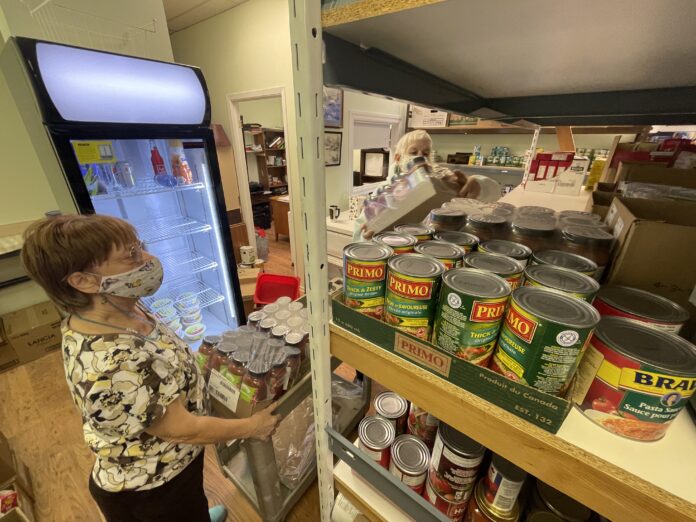“A bag, or a bag and a half and you’re at $50,” said Joanne Barnes. She’s talking about a trip to the grocery store; a lot of Highlanders are experiencing the same thing these days, with inflation hitting an 18-year high. Barnes knows all too well how rising food prices affect residents. She manages the Minden Community Food Centre.
She said this year has further exposed how prevalent food insecurity is in the County. “I said all along in the beginning of October we were going to see people lined up out the door. That’s what has happened.”
Food banks across Haliburton County are reporting high usage and changing demographics; those who work in the field are calling for urgent action to address the crisis.
Tina Jackson, executive director of the Central Food Network in Highlands East, said there’s been a year-on-year increase in food bank use.
Now, you’ve got a whole new set of people who have never been in this situation before.
Joanne Barnes
She said the food bank assisted 318 people in 2018, 394 in 2019, and 525 in 2020. “We just can’t sustain this significant increase, year after year,” she said, adding the food bank needs “urgent” support to maintain current service levels due to soaring food costs.
Barnes said the end of COVID-19 supports means some clients haven’t budgeted for taxes, or don’t qualify for income supports. “Now, you’ve got a whole new set of people who have never been in this situation before,” she said, mentioning a family who had been sleeping in a tent after losing their home. “What we’re seeing now is desperation.”
Jackson said Haliburton’s tourism and hospitality sector, hit hard by shutdowns and restrictions the last two years, is also an industry where many jobs pay minimum wage or just above. “It had a greater impact on low-income workers,” she said.
In Haliburton County, that means “we have a huge portion of our economy and residents connected with that.” Judy MacDuff of the 4Cs food bank said she’s seen an increase in younger people seeking help at their York Street location in Haliburton. Last estimates put Haliburton’s lowincome population at just over 17 per cent, compared with 12.3 per cent Ontario-wide.
Yet all three food banks try to address more than just food needs; Feed Ontario estimates 90 per cent of food banks in the province offer other vital services such as help dealing with energy bills.
Jackson also runs Heat Bank Haliburton County, which in 2020 alone assisted 276 people, supplying firewood, providing energy kits or helping unlock energy benefits. More than 47 per cent of residents in Haliburton County pay more than 10 per cent of their income on heating costs.
“The majority of the households we’re working with are struggling to cover hydro and heating bills because of a lack of income,” Jackson said. “There’s overlap there.”
For Dr. Valerie Tarasuk of PROOF, a University of Toronto interdisciplinary study group focusing on Canadian food insecurity, that overlap suggests food banks aren’t a long-term solution for hungry Highlanders.
“By the time someone doesn’t have enough money to buy food there are other things missing besides food,” she said. Systemic solutions “We can absorb ourselves with activities of collecting food, Tarasuk said, referring to festive fundraisers Canada-wide.
“It sounds like we’re doing a gigantic thing. But it’s so out of sync with the scale of the problem.” While food banks can offset grocery bills and meet emergency needs, Tarasuk hasn’t found evidence suggesting food banks can move households out of food insecurity. Instead, she points to studies that show basic income, for example, or a minimum wage which more accurately reflects living costs, target the source.
PROOF also states that programs such as the Canada Child Benefit have helped reduce instances of severe food insecurity.
For those working on the ground like Jackson, it’s difficult to balance a desire for long-term solutions with the increased number of visits. “I think it’s really difficult to get public buy-in and political buy-in when the answer isn’t immediate,” said Jackson. “The answer to addressing poverty is not going to be an instant solution.”
MPP Laurie Scott said her government has invested in food support programs across the Highlands, noting multiple provincial grants that have funded SIRCH training programs or food banks. “We’ve invested in a lot of that to help these communities,” Scott said.
Feed Ontario’s 2021 hunger report states that Ontario’s social assistance programs, ODSP and OW, totaling $8,796 and $14,028 a year, are “significantly below the level needed for a standard of living that is adequate for the health and well-being of the recipient and their family.”
The 2016 census reports Haliburton County’s unemployment rate at 9.6 per cent, 2.2 percentage points higher than the province’s.
Barnes and Jackson see many who are employed seeking food bank services. “A wage has to be higher than what it is, to be able to sustain a person, $14 or $15 an hour doesn’t cover it,” Barnes said.
Scott said raising the minimum wage could discourage job opportunities. “There’s a very fine balance between supporting employees or the fact they’ll close up shop or stop expanding,” she said. Scott added there are many openings for positions in industries, like construction, that pay well.

However, in the four years leading up to the COVID-19 pandemic, the percentage of those with jobs accessing Ontario food banks grew by 44 per cent. PROOF claims that 65 per cent of those going to food banks report salaries and earnings as the main source of income: “Simply having a job is not enough; low-waged jobs and precarious work means people in the workforce often don’t have enough income to be food-secure,” states PROOF’s website.
In an address to parliament Dec. 16, MP Jamie Schmale said the Liberal government’s newly-passed aid package represents government spending that drives inflation, “making the savings of many in the working-class worth less.”
He said living costs are rising “because the government has thrown all this money up into the atmosphere, and refuses to change course.” While Jackson and Barnes acknowledge politics, inflation and systematic changes all play a role in the Highlands, they and their volunteers are focused on those needing urgent help.
“We need more political buy-in to address the deep systemic changes we need to address these things, but we certainly still need investments in the non-profits that are doing the grassroots work,” Jackson said. “People still need to be fed, people still need warmth while these things are happening.”





